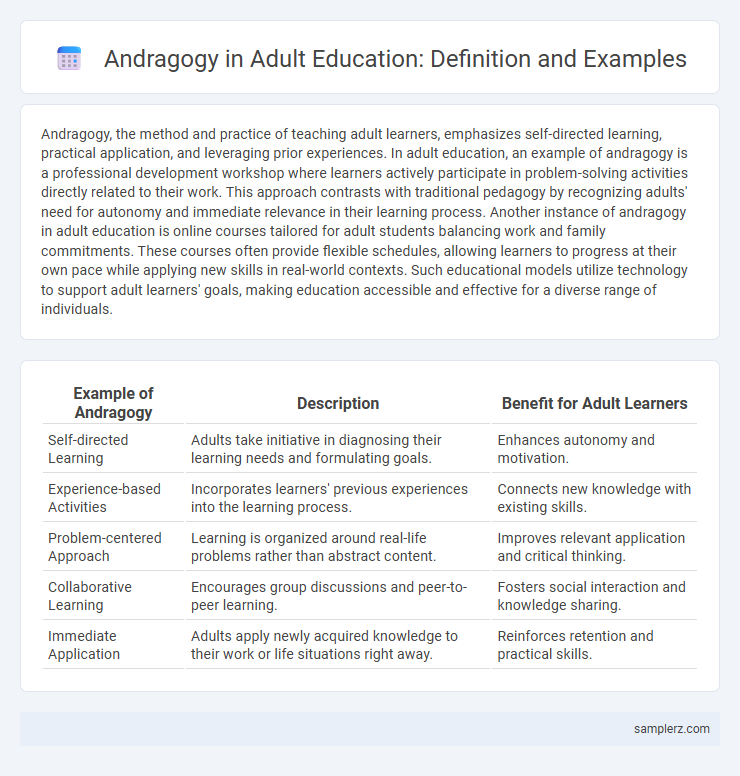Andragogy, the method and practice of teaching adult learners, emphasizes self-directed learning, practical application, and leveraging prior experiences. In adult education, an example of andragogy is a professional development workshop where learners actively participate in problem-solving activities directly related to their work. This approach contrasts with traditional pedagogy by recognizing adults' need for autonomy and immediate relevance in their learning process. Another instance of andragogy in adult education is online courses tailored for adult students balancing work and family commitments. These courses often provide flexible schedules, allowing learners to progress at their own pace while applying new skills in real-world contexts. Such educational models utilize technology to support adult learners' goals, making education accessible and effective for a diverse range of individuals.
Table of Comparison
| Example of Andragogy | Description | Benefit for Adult Learners |
|---|---|---|
| Self-directed Learning | Adults take initiative in diagnosing their learning needs and formulating goals. | Enhances autonomy and motivation. |
| Experience-based Activities | Incorporates learners' previous experiences into the learning process. | Connects new knowledge with existing skills. |
| Problem-centered Approach | Learning is organized around real-life problems rather than abstract content. | Improves relevant application and critical thinking. |
| Collaborative Learning | Encourages group discussions and peer-to-peer learning. | Fosters social interaction and knowledge sharing. |
| Immediate Application | Adults apply newly acquired knowledge to their work or life situations right away. | Reinforces retention and practical skills. |
Real-World Problem Solving in Adult Classrooms
Real-world problem solving in adult classrooms exemplifies andragogy by emphasizing learners' experiences and practical application of knowledge. Adult students engage in collaborative projects that address workplace challenges, enhancing critical thinking and decision-making skills. This approach fosters learner autonomy and directly connects education to everyday professional and personal situations.
Self-Directed Learning Projects for Professionals
Self-directed learning projects empower professionals to tailor their education based on personal goals, enhancing skill development in real-world contexts. These projects foster critical thinking and problem-solving by encouraging learners to identify knowledge gaps and seek relevant resources independently. Implementing andragogical principles in workplace training boosts motivation and retention among adult learners, promoting continuous professional growth.
Collaborative Group Activities Among Adult Learners
Collaborative group activities among adult learners enhance critical thinking and real-world problem-solving skills by leveraging diverse experiences and perspectives. These activities promote active engagement, foster mutual respect, and facilitate knowledge sharing, which aligns with andragogy principles emphasizing self-direction and practical application. Structured group projects, peer discussions, and case study analyses exemplify effective methods that support adult learners' intrinsic motivation and collaborative learning.
Integrating Life Experiences in Adult Education
Integrating life experiences in adult education involves techniques like reflective journaling, where learners connect course content to personal and professional backgrounds, enhancing comprehension and retention. Case studies based on real-world scenarios allow adults to apply theoretical concepts to familiar situations, promoting practical problem-solving skills. Group discussions encourage sharing diverse perspectives, leveraging collective experiences to deepen understanding and foster collaborative learning environments.
Flexible Learning Pathways for Working Adults
Flexible learning pathways accommodate working adults by offering modular courses and self-paced online programs, allowing learners to balance education with employment responsibilities. This approach leverages technology-enabled platforms and competency-based assessments to tailor instruction to individual needs and schedules. Employers increasingly support such models through tuition assistance and partnerships with educational institutions, enhancing skill development and career advancement opportunities.
Technology-Enhanced Andragogical Strategies
Technology-enhanced andragogical strategies include the use of interactive e-learning platforms, virtual simulations, and mobile learning apps to facilitate adult learners' engagement and self-directed study. These tools support personalized learning paths and immediate feedback, accommodating diverse learning styles and schedules. Incorporating technologies like learning management systems (LMS) and video conferencing promotes collaborative learning and enhances access to resources for adult education.
Case Study-Based Learning for Adult Skill Development
Case Study-Based Learning in adult education enhances critical thinking and practical problem-solving by immersing learners in real-world scenarios relevant to their professional contexts. This andragogical approach facilitates experiential learning, enabling adults to apply theoretical knowledge to complex cases, thus improving skill development and decision-making competence. The method supports self-directed learning, encouraging learners to draw on prior experiences and collaborate on solutions, which aligns with core principles of adult learning theory.
Peer-to-Peer Knowledge Sharing in Adult Programs
Peer-to-peer knowledge sharing in adult education programs leverages the experiential wisdom and diverse backgrounds of learners to enhance understanding and skill acquisition. This method fosters collaborative learning environments where adults actively exchange insights, solve problems, and refine competencies through discussion and mentorship. Research shows that incorporating peer collaboration increases engagement, retention, and practical application of knowledge in professional and personal development settings.
Immediate Application of Learning to Job Roles
Andragogy emphasizes the immediate application of learning by tailoring educational content to align directly with adults' job roles, enabling skill acquisition that enhances workplace performance. Techniques such as case studies, simulations, and real-world problem-solving foster practical engagement, ensuring that knowledge transfer translates quickly into improved job functions. This approach increases motivation and retention by connecting learning outcomes with tangible professional benefits.
Facilitator Approach in Adult Learning Environments
The facilitator approach in adult learning environments emphasizes collaborative learning, where educators guide rather than direct, fostering critical thinking and self-reflection among adult learners. Techniques such as group discussions, problem-solving activities, and peer feedback encourage active participation and real-world application of knowledge. This method aligns with Malcolm Knowles' principles of andragogy, promoting autonomy and leveraging learners' prior experiences for deeper understanding.

example of andragogy in adult Infographic
 samplerz.com
samplerz.com